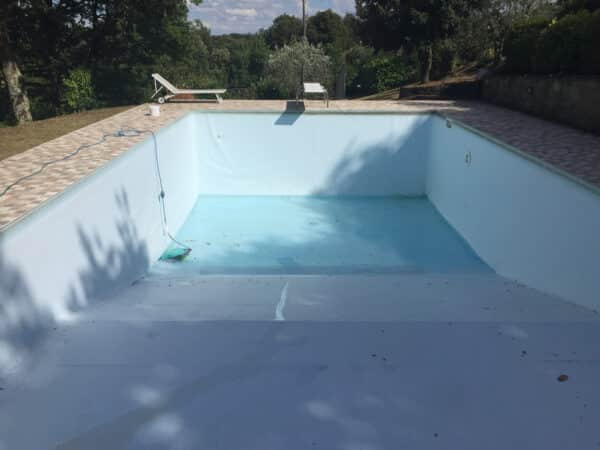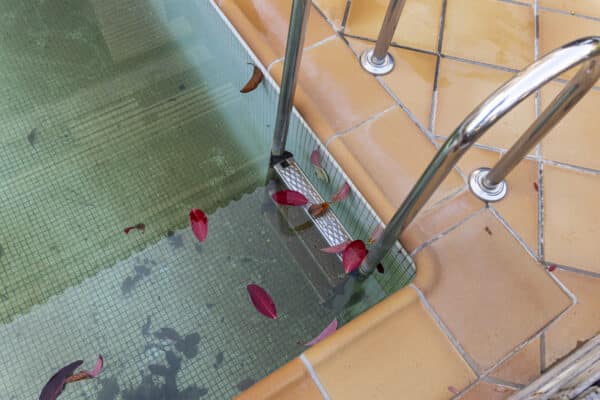When building, upgrading, or simply maintaining the swimming pool, there are lots of options to consider. One important decision is the kind of chlorination system the pool will use. Two of the most common and popular are the saltwater system and the chlorine system. Both are intended to keep the water clean and healthy for swimming.
The biggest difference between saltwater and chlorine systems is that one has salt in the pool and the other does not – simple as that. Both types use chlorine to keep your pool disinfected, although there are pros and cons to each.
Saltwater Pools
Despite popular belief, saltwater pools are not filled with salty seawater – the amount of salt added to the pool is significantly less than ocean water. Another misconception is that saltwater systems don’t use chlorine.
Saltwater systems don’t need commercial-grade chlorine added, but chlorine is still used in this type of pool. The system actually converts the salt to chlorine — but just enough to keep the water clean without over chlorinating it.
Pro: Gentler Chlorination For More Comfort
Salt chlorinators use less chlorine than a “chlorine” pool, and the amount of salt is similar to that in a person’s tears. It’s a far more pleasant water to swim in for your skin, hair, and eyes, as well as your bathing suits. Open your eyes with no pain!
Pro: No Need to Deal with Chlorine
Salt systems allow homeowners to achieve more balanced water with less attention, which is a definite “pro” for most homeowners. It also means the pool needs less chemicals to keep the water balanced – instead of purchasing chlorine, you only have to spend about $20 for a year’s worth of salt. Cutting back on the handling of a corrosive chemical is always a good thing!
Con: More Expensive To Purchase and Maintain
The generator for the salt water pool costs around $1,000, so the initial cost is higher than a traditional chlorine pool system. However, salt water based pools also require less chlorine… so that initial cost may end up paying for itself over time
Maintenance on a saltwater system can also be more expensive, which can be a con for the budget conscious. Components should be replaced a lot more frequently due to the fact that salt corrodes (a sad fact of life). Another con is that saltwater systems require more electricity to run.
Con: Hard on Plants
You should make sure to think about your landscaping prior to getting a salt based pool. Why? Well, because salt water robs the land of vital nutrients and can actually kill plants.
Chlorine Pools
Traditional chlorine system pools require manufactured chlorine to be added to the pool on a weekly basis. This can be in tablet, stick or liquid form. Generally, a chlorine float is used to hold and distribute the chlorine throughout the water.
Pro: Chlorine Systems are Common
A lot of folks who have been around pools all their life understand the best way to deal with a chlorine pool. A salt water pool is unknown to many. A lot of individuals tend to be more comfortable with what they are already used to.
Pro: Less Expensive to Install and Maintain
For those on a budget, a chlorine-based pool may be the better option. Chlorine pools are initially less expensive to install and maintain than saltwater systems, although you do have to spend more on pool chemicals over time (compared to only $20/year with a salt system). They also have a lower energy cost and need less equipment.
Con: Require More Chemical Balancing
Although chlorine systems are cheaper than salt, they do require more frequent maintenance and monitoring to ensure the chlorine is balanced. A chlorine system can also require balancing agents to be added to the water to help prevent any harmful effects of the chlorine.
Con: Handling Harsh Chemicals
Chlorine systems have a higher amount of chlorine concentration which can be harsh on swimmers’ skin, hair and eyes.
Choosing Between Chlorine and Saltwater Pool Systems
There are pros and cons to each system, so choosing the right one really comes down to individual preference of the pool owner. Professional pool service companies can easily work with either type of system when it comes to regular weekly maintenance. When deciding between what type of system to use, it’s best to be as educated about each as possible, weigh the pros and cons, and then decide based on your specific needs.


